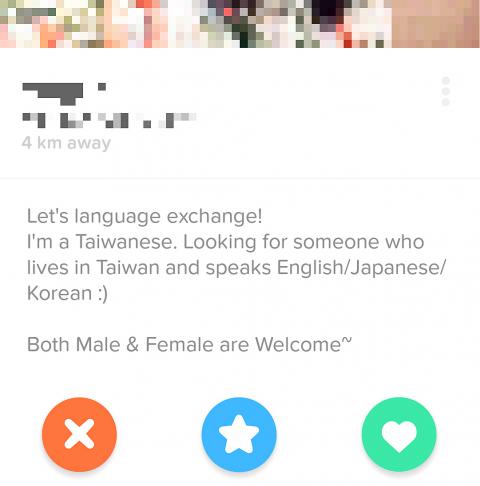“Tinder is so different here,” my Taiwanese friend who is spending a year in the US tells me. “People are so direct, and I’m getting all these [genital] photos too!”
I admit I’m still a bit surprised — of course I know what Tinder really is meant to be used for, but I never had a chance to swipe left or right despite living in the US when the app launched in 2012.
I didn’t have a smartphone for starters, but there was absolutely no point in using Tinder, or any dating app for that matter, in an isolated Wild West town of 9,000 people where everyone knew each other. I tried using Match.com, and it was painfully awkward, especially when everyone knows you as the editor of the local newspaper. So you simply wait for new people to move to town, hope they are single and act really, really fast.

Han Cheung, Taipei Times
Back in Taiwan and not knowing many people besides my childhood friends, I finally caved in to the Tinder craze after a break up.
WHAT’S IN A PROFILE
Expected were the trying-too-hard-to-look-cute girls making duck faces and ridiculous poses, the obviously fake accounts with the sexy poses and revealing clothing, and the ones with no photos of themselves — only clouds, rabbits and in one case, a ruler.

Han Cheung, Taipei Times
There was a lack of female expats or locals with good English skills — as opposed to what I was hearing from my female colleague regarding the male counterparts. My Chinese typing was rusty back then, so things started slowly. I was also thinking too much trying to craft “thoughtful” and “witty” messages, and most conversations went nowhere.
Needless to say, I found little success. I also soon noticed the number of “no FWB [friends with benefits]” and “no ONS [one night stands]” warnings in the profiles. Nothing wrong with that, I thought — this is not America.
Then it got somewhat tedious.
“I’m looking for new friends.” “I’m looking for language exchange partners. Male and female both welcome.” “I’m in a relationship and I’m only looking for friends.” ‘I’m not looking for anything romantic. Stay away.”
OK — so we understand that it’s not that much of a hookup app in Taiwan. But not even romance? It seemed to be the case, as people’s responses were usually overly polite or bland. That caused me to become overly aware of saying something inappropriate, and the conversations continued to go nowhere.
My friend tells me that it’s all a farce, and I should not play into their game of pretend. But when I later dated someone who continued to insist that she really, really, really downloaded the app to “practice English,” I just got more confused. No, you simply do not go to a site where you connect with people based on how hot they are to practice a foreign language. There are other resources for that.
NO CREEPS
Finally, I asked a date who had similar messages on her profile what this no sex, no romance thing is all about.
“Oh, that’s to ward off the creepy people who ask for sex right off the bat,” she said.
Anyhow, my interest in Tinder soon waned as I started meeting more people in real life, which I found more enjoyable than my pathetic online stint. I still kept the app running and replied to messages occasionally, putting minimal effort into the chatting. Instead of trying to think of the perfect, attention-grabbing opener, I just typed “Hey” and “Sup” without even punctuation marks.
Surprisingly, people actually started messaging me more often — I even got a “go [expletive] yourself” just for taking seven days to reply to a message. One time, after a month of not using Tinder, I messaged “Want to grab a drink?” to my entire match list on a whim to see who would reply.
“Do you send that to everyone?” one woman asked. Most didn’t reply, but there were three who said, “Sure!”
And then I finally was convinced that the subtlety is really superficial. And yes, sadly, to a certain degree it’s a numbers game and you do not actually need that witty first message.

June 2 to June 8 Taiwan’s woodcutters believe that if they see even one speck of red in their cooked rice, no matter how small, an accident is going to happen. Peng Chin-tian (彭錦田) swears that this has proven to be true at every stop during his decades-long career in the logging industry. Along with mining, timber harvesting was once considered the most dangerous profession in Taiwan. Not only were mishaps common during all stages of processing, it was difficult to transport the injured to get medical treatment. Many died during the arduous journey. Peng recounts some of his accidents in

“Why does Taiwan identity decline?”a group of researchers lead by University of Nevada political scientist Austin Wang (王宏恩) asked in a recent paper. After all, it is not difficult to explain the rise in Taiwanese identity after the early 1990s. But no model predicted its decline during the 2016-2018 period, they say. After testing various alternative explanations, Wang et al argue that the fall-off in Taiwanese identity during that period is related to voter hedging based on the performance of the Democratic Progressive Party (DPP). Since the DPP is perceived as the guardian of Taiwan identity, when it performs well,

A short walk beneath the dense Amazon canopy, the forest abruptly opens up. Fallen logs are rotting, the trees grow sparser and the temperature rises in places sunlight hits the ground. This is what 24 years of severe drought looks like in the world’s largest rainforest. But this patch of degraded forest, about the size of a soccer field, is a scientific experiment. Launched in 2000 by Brazilian and British scientists, Esecaflor — short for “Forest Drought Study Project” in Portuguese — set out to simulate a future in which the changing climate could deplete the Amazon of rainfall. It is

The Taiwan People’s Party (TPP) on May 18 held a rally in Taichung to mark the anniversary of President William Lai’s (賴清德) inauguration on May 20. The title of the rally could be loosely translated to “May 18 recall fraudulent goods” (518退貨ㄌㄨㄚˋ!). Unlike in English, where the terms are the same, “recall” (退貨) in this context refers to product recalls due to damaged, defective or fraudulent merchandise, not the political recalls (罷免) currently dominating the headlines. I attended the rally to determine if the impression was correct that the TPP under party Chairman Huang Kuo-Chang (黃國昌) had little of a